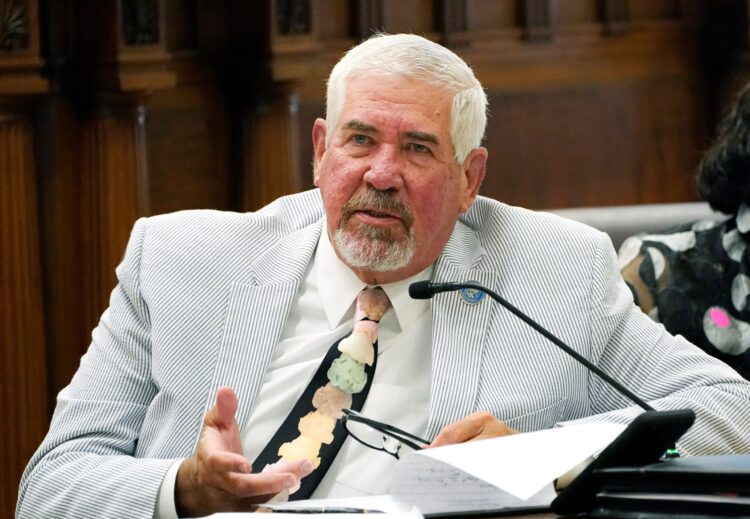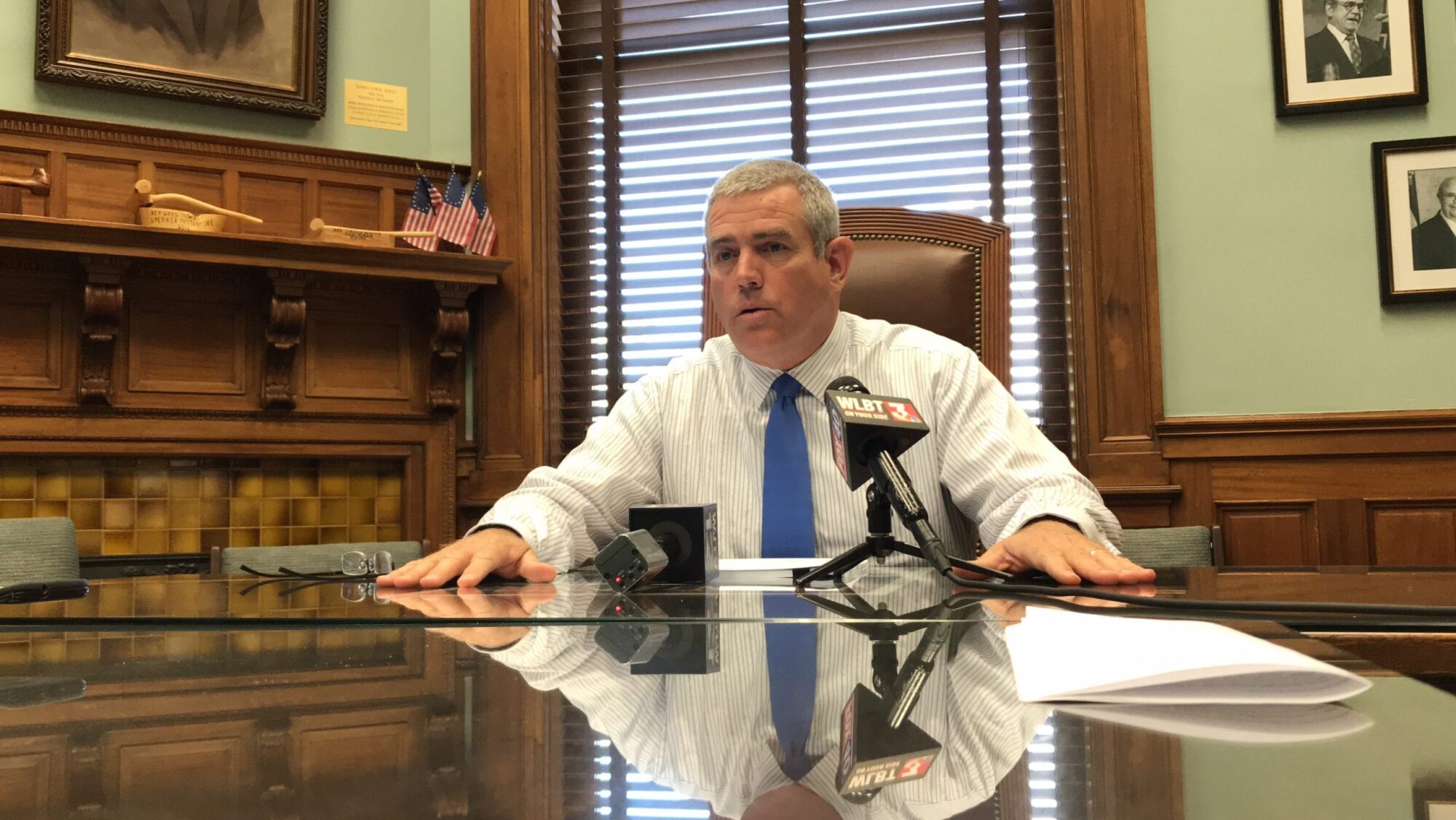
Sen. Kevin Blackwell (AP Photo/Rogelio V. Solis - Copyright 2021. The Associated Press. All rights reserved)
See what’s in the latest version of the “Mississippi Medical Cannabis Act.”
The latest iteration of a Medical Marijuana bill has been filed in the Mississippi State Senate. The bill number is SB 2095 and it is titled, “The Mississippi Medical Cannabis Act.”
State Senator Kevin Blackwell (R), the lead negotiator in the chamber, filed the bill as expected. It has been assigned to the Senate Public Health and Welfare Committee chaired by State Senator Hob Bryan (D).

The 445-page bill did make some changes from the prior versions offered up for review, chief among them being the amount allowed to a patient. This new bill reduces the amount of the cannabis equivalency unit from 4 grams to 3 1/2 grams, allowing no more than 28 units in a 30-day period and seven in one week.
Whether that will satisfy Governor Tate Reeves’ opposition on that sticking point is yet to be seen.
The Mississippi Department of Health (MSDH) would have ultimate authority for oversight of the administration of the program, including testing, research, ID cards to patients, registering practitioners, and the licensing of cultivation facilities, processing facilities, transportation entities, and disposal entities.
MSDH is to delegate the responsibilities for the inspection, regulation and enforcement of cannabis cultivation facilities, processing facilities, transportation entities, and disposal entities to the Department of Agriculture (MDAC). The Ag Department will be allowed to contract with other governmental agencies and public or private third parties to assist with carrying out any of its responsibilities.
The Department of Revenue (MDOR) will be responsible for tax issues in terms of licensing, inspection, and oversight of medical cannabis dispensaries.
The bill says MSDH should begin accepting applications, registering and licensing ID cards and practitioners no more than 120 days after it passes. After 120 days, MSDH should begin licensing and registering cannabis cultivation facilities, processing facilities, testing facilities, research facilities, disposal entities, and transportation entities.
A specific provision of the bill related to the Department of Public Safety (DPS) states that that agency is not to be involved in or have any role regarding the administration, regulation or oversight of the program. However, that does not prohibit DPS from carrying out any law enforcement activities that a law enforcement agency may exercise under this chapter or that DPS may exercise under the authority of any other law. DPS may assist MSDH in conducting background checks as required.
The bill would make the following activities lawful:
- Purchase, transportation, possession of up to the allowable amount, or medical use of, medical cannabis
- Reimbursement by a patient to the patient’s caregiver for direct costs incurred by the caregiver for assisting the patient’s medical use of medical cannabis
- Compensating a dispensary for goods or services provided
- Providing or selling equipment used to ingest medical cannabis to a cardholder
- Acting as a designated caregiver to assist a registered qualifying patient with the act of using or administering cannabis
- Certain activities by medical cannabis establishments
In addition, the bill says an applicant for a professional or occupational license should not be denied a license based on previous employment related to medical cannabis activities.
Of note, the bill, among other things, does not:
- Require insurers to pay for or reimburse any other individual or entity for costs associated with the medical use of cannabis
- Require employers to modify any job or working conditions of any employee who engages in the medical use of medical cannabis
- Prohibit any employer from refusing to hire, discharging, disciplining, or otherwise taking an adverse employment action against an individual with respect to hiring, discharging, tenure, terms, conditions, or privileges of employment as a result, in whole or in part, of that individual’s medical use of medical cannabis
- Prohibit or limit the ability of any employer from establishing or enforcing a drug testing policy
- Interfere with, impair, or impede, any federal restrictions or requirements on employment or contracting, including, but not limited to, regulations adopted by the United States Department of Transportation
- Permit, authorize, or establish any individual’s right to commence or undertake any legal action against an employer for refusing to hire, discharging, disciplining, or otherwise taking an adverse employment action against an individual with respect to hiring, discharging, tenure, terms, conditions, or privileges of employment due to the individual’s medical use of medical cannabis
- Affect, alter, or otherwise impact the workers’ compensation premium discount available to employers who establish a drug-free workplace program
- Affect, alter, or otherwise impact an employer’s right to deny, or establish legal defenses to, the payment of workers’ compensation benefits to an employee on the basis of a positive drug test or refusal to submit to or cooperate with a drug test
- Affect, alter, or supersede any obligation or condition imposed on a parolee, probationer, or an individual participating in a pretrial diversion program or other court-ordered substance abuse rehabilitation program.
The bill allows any resident of Mississippi to petition MSDH to add serious medical conditions or their treatments to the list of debilitating medical conditions allowed to be treated by the product.
As for local control over zoning, the bill states that a municipality or county may enact ordinances or regulations not in conflict with this chapter, governing the time, place and manner of medical cannabis establishment operations in the locality. However, no municipality or county may prohibit dispensaries either expressly or through enactment of ordinances or regulations that make their operation impracticable in the jurisdiction.
Further, the bill says the main point of entry of a medical cannabis establishment should not be located within 1,000 feet of the nearest property boundary line of any school, church or childcare facility. A medical cannabis establishment may receive a waiver through approval from a school, church or childcare facility and application for a waiver with its respecting licensing agency, provided the main point of entry is not located within 500 feet of the nearest property boundary line of any such facility.
A municipality or the county board of supervisors may opt out through a vote of the board within ninety (90) days after the effective date of the bill. The same local board can vote to opt back in at a later date. However, if the local boards do not act, the cultivation, processing, sale, and distribution of medical cannabis and cannabis product is automatically made legal in every county and municipality in Mississippi.
Banks are provided the legal cover to offer services to any person or entity licensed in this state to engage in the business of medical cannabis, or with any person or entity engaging in business dealings with such licensee, if the bank provides those services to any other business. However, banks are not required to provide financial services to a licensed medical cannabis establishment.
The bill allows for a 5% excise tax and makes the product subject to applicable state sales tax.
The legislation allows establishes a 9-member advisory committee, the Medical Cannabis Advisory Committee, with 3 members appointed by the Governor, 3 members appointed by the Lt. Governor, and 3 members appointed by the Speaker of the House. It is being established to advise the Legislature about medical cannabis and cannabis product, patient care, services, and industry. The Committee is to meet at least two times a year.
Agriculture Commissioner Andy Gipson tweeted about his concern over one change from the prior iterations of the bill.
“One thing I did not expect, and I don’t think most Mississippians would expect: this Senate bill would authorize marijuana users to carry concealed weapons at line 5879,” Gipson wrote. “I just hope and pray the Legislature doesn’t mess up our hard-fought gains in concealed carry and permitless carry laws. We worked hard to pass those laws only a few years ago.”
I just hope and pray the Legislature doesn’t mess up our hard-fought gains in concealed carry and permitless carry laws. We worked hard to pass those laws only a few years ago.
— Commissioner Andy Gipson (@CommAndyGipson) January 12, 2022
Blackwell’s bill is likely to pass out of the Senate Public Health and Welfare Committee as soon as today, and it could hit the Senate floor by Thursday, that is if all goes according to plan.
The floor debate will be one to watch, as Senators on both sides of the aisle may offer amendments and speak on the bill. Ultimately, political onlookers will be watching to see what the final vote is in the chamber and if it is veto-proof should Governor Reeves decide to take such an action.
You can read the full version of the bill here.
###
UPDATE:
- The Mississippi Senate Public Health and Welfare Committee passed the bill out of committee. The full Senate could take it up as early as Thursday.











